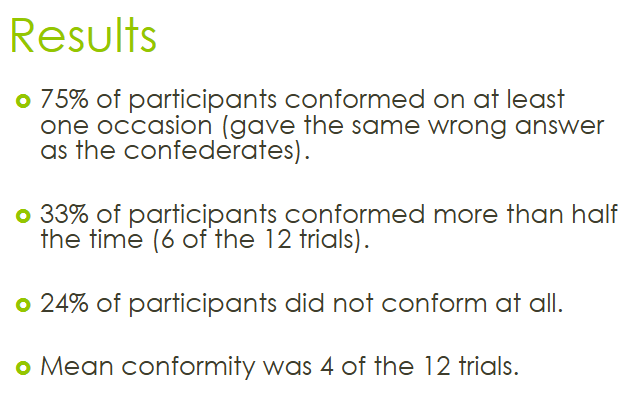9. Conformity
tendency to adjust one’s thoughts or feelings or behaviours in order to be more consistent with those of other people, groups or social norms.
Asch’s experiment
investigated pressure to conform
factors that influenced conformity:
Group size
Whether the group is unanimous
tested 50 first-year college students
participants were told the experiment was a study on visual perception/ visual
6 confederates (members who know about the experiment but pretend that they are participants) and 1 participant
12 out of 18 trials gave the same wrong answers, 6 trials gave correct answers
2 main reasons to conform:
wanted to be part of the group
did not want to experience criticism from group

Group size
Conformity did not continue to increase significantly Group size more than four confederates.
Conformity decreased after group size exceeded 15
this could be because there is more attention divided within a smaller group than as a larger group
Unanimity
Unanimity is the complete agreement among group members as to what the answer is.
It is difficult to be a minority/outsider and stand against group even though they might think they are right
the presence of even a singular ally who shares one’s view can be seen as providing social support which strengthens resistance to conformity
Informational influence
Informational influence occurs when conformity results from a need for direction and information on the correct response to a specific situation.
→ want to provide correct response but are unsure about the correct answer.
occurs when:
participant feels incompetent
task is difficult
concerned about being right
Normative influence
Normative influence occurs when we conform to a group situation due to social norms because we want to fit in, be accepted and liked, gain approval & praise
Culture
lowest conformity occurred in individualist cultures (Europe) where being individualist is valued over the achievement of group goals
higher conformity occurred in collectivist cultures (Asia, Africa) where group goals is more important than personal goals
Social loafing
refers to the tendency of an individual to make less effort when involved in group activity than when working alone
Conforming occurs because individuals believe their conforming won’t create much of an influence on what group decides.
Deindividuation (prison guard experiment)
refers to the loss of individuality or sense of anonymity that can occur in a group situation, allowing individuals to act as a group rather than their own (can’t be pinpointed to blame)
factor are anonymity and a shift in attention
less likely to reflect on the appropriateness of their actions and give less thought to the consequence of their behaviour
Ethical issues in conformity studies
deception
participants do not truly give consent